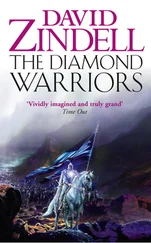David Gibbins - The Tiger warrior
Здесь есть возможность читать онлайн «David Gibbins - The Tiger warrior» весь текст электронной книги совершенно бесплатно (целиком полную версию без сокращений). В некоторых случаях можно слушать аудио, скачать через торрент в формате fb2 и присутствует краткое содержание. Жанр: Прочие приключения, на английском языке. Описание произведения, (предисловие) а так же отзывы посетителей доступны на портале библиотеки ЛибКат.
- Название:The Tiger warrior
- Автор:
- Жанр:
- Год:неизвестен
- ISBN:нет данных
- Рейтинг книги:4 / 5. Голосов: 1
-
Избранное:Добавить в избранное
- Отзывы:
-
Ваша оценка:
- 80
- 1
- 2
- 3
- 4
- 5
The Tiger warrior: краткое содержание, описание и аннотация
Предлагаем к чтению аннотацию, описание, краткое содержание или предисловие (зависит от того, что написал сам автор книги «The Tiger warrior»). Если вы не нашли необходимую информацию о книге — напишите в комментариях, мы постараемся отыскать её.
The Tiger warrior — читать онлайн бесплатно полную книгу (весь текст) целиком
Ниже представлен текст книги, разбитый по страницам. Система сохранения места последней прочитанной страницы, позволяет с удобством читать онлайн бесплатно книгу «The Tiger warrior», без необходимости каждый раз заново искать на чём Вы остановились. Поставьте закладку, и сможете в любой момент перейти на страницу, на которой закончили чтение.
Интервал:
Закладка:
Hiebermeyer pushed up his glasses and leaned over, lifting it up gingerly to look underneath. “Well, it’s clearly a piece of armor, for the lower forearm and hand,” he asserted. “In the hollow under the head there’s a crossbar, and the mouth has a hole in it the size of a blade. My opinion is that this was once a gauntlet with an attached dagger or sword blade.”
“Full marks,” Jack said. “Not a thrusting blade, but a long, flexible blade, for sweeping cuts. It would have been awkward in unskilled hands, but with the gauntlet and the crossbar, rather than a conventional sword handle, the blade would have become like an extension of the arm. The swordsman could deliver a massive sweeping blow, easily enough to slice bodies in half with a razor-sharp blade. They were fearsome weapons, designed to be used from horseback.”
Rebecca touched the nose. “Those eyes look Chinese.”
“It’s called a pata, a gauntlet sword,” Jack said. “This one’s unique, and only a few other brass ones are known. Steel patas were used by the Marathas, the warrior-princes the British fought in southern and central India in the eighteenth century. But the British scholar who first studied patas thought they originated much earlier, among the Tatar ancestors of the Mongols in northern China. They could have come into India with the Mongol invaders, with Timur the Great in the fourteenth century, or Genghis Khan. Or one might have come much earlier by way of the Silk Route and then been copied. Most of the Indian patas of the seventeenth or eighteenth century are made of steel, and don’t have this decoration, the hammered-out head. My instinct is that this one is older, much older, possibly even of ancient date.”
“So what’s the connection?” Costas said.
“You asked about the god, the sacrificial god in the jungle,” Jack replied. “There were several, one of them a kind of earth goddess, another a god of war. But there’s only one shrine we know of, and that’s to Rama, the god who gave his name to the district. The legend of Prince Rama is wrapped up in Hindu mythology, but the version of Rama worshipped in the jungle was distinctive, possibly of very early origin. The shrine is mentioned in the records of the Rampa Rebellion because the rebel leader Chendrayya sacrificed two police constables there. It lies directly inland from the point where the Shamrock picked up Lieutenant Hamilton and his sappers after their foray in the jungle. And I believe it was where my ancestor found this pata. It was the only permanent structure in the jungle other than the huts of the villagers, and exactly where you’d expect such an unusual object to be stored, even venerated.”
“And you want to go and check it out,” Costas said.
“I need to see what he saw. To see if there’s anything still left.”
“Rama,” Hiebermeyer murmured, tapping his fingers on the table. “Rama”
“What is it?” Costas said.
“Just thinking aloud.”
Costas picked up the pata and stared at the face. “What is it? A god?”
Jack looked across. “It’s a tiger.”
“A tiger god?” Costas asked.
Jack slipped the pata over his hand, holding the crossbar. “Not tiger god,” he said, turning it slowly on his arm. “It’s what we always called it when I was growing up, what my grandfather told us to call it. He must have learned it from his grandfather, from John Howard. It’s what made Katya nearly faint when I described it to her. Tiger warrior.”
Early the next morning they stood on the bridge wing gazing out over the bows of the ship. Seaquest II had passed through the Palk Strait between India and Sri Lanka, navigating the treacherous channel at only a couple of knots speed. They had just watched the pilot disembark and power off in his speedboat. The northern tip of Sri Lanka was now receding off the starboard stern quarter, and the captain had reduced the alert level as they entered Indian territorial waters. The Breda gun turret had been lowered out of sight below the foredeck and the security team were stowing the two general purpose machine guns, which had been mounted on either side of the bridge. Ahead of them lay the Bay of Bengal, a shimmering expanse of water seemingly stretching out to infinity. The sea was dead calm, and it was as if they were motionless, mired in a haze of sea and sky with no visible horizon.
Jack sensed the whiff of excitement that had first drawn western explorers-his own ancestors-into these waters. The eastern sky seemed full of allure, and with the risks that made the draw that much more beguiling. Jack had been thinking about the Romans again. Here, two thousand years ago, they would have been on the cusp of the unknown, the place where the author of the Periplus had drawn the line between what he himself had seen, and the world beyond. Ahead lay places half-imagined, which the author knew only from the goods that were brought to him-silk, lapis lazuli, exotic spices and medicaments, carried by traders across great mountains and deserts to the sea. The traders he met would have told him little, and what they did tell might have been deliberately misleading, designed to put him off searching for the sources himself Yet their tales would have needed little exaggeration. The dangers were all too real, even today. Jack remembered the final lines of the Periplus. What lies beyond this region, because of extreme storms, immense cold and impenetrable terrain, and because of some divine power of the gods, has not been explored.
Costas came up beside him, and turned to speak. “Rebecca wants to come with us, Jack. She has three weeks’ more holiday from school.”
“She can come to the Roman site at Arikamedu, but not to the jungle. It’s bandit country out there. The place is a haven for Maoist terrorists. It’s heated up since the Indian government allowed foreign mining speculators into the jungle, and the Maoists have stirred up the tribal people.”
“Okay, you tell her.”
“She seems to listen to you, Uncle Costas.”
“She knows already.” Aysha was standing on the other side of Jack. “I told her.”
“Oh, thanks, Aysha.” Jack’s eye was suddenly caught by a spectacular image. The eastern shoreline of India had been visible a few miles off the port bow, but was now lit up by the morning sun as it rose above the haze to the east. It was an extraordinary sight, a thin line of beach and fringing palms glowing orange, as if a channel of fire were ripping up the shore toward the northern horizon. Jack thought of India in 1879, the year of the jungle rebellion. It was an India of Mughal opulence and colonial civility, yet there was another India, a darker place of desperation and cruelty, of starvation, of disease that took half the children and would kill a person within a day. Two decades before the Rampa Rebellion, India had been torn apart by the mutiny of the Indian troops of the East India Company’s Bengal Army, an orgy of barbarism and bloodshed. Three years before the rebellion, in 1876, a dreadful famine had settled in the south and killed millions. India seemed a place of temptation, yet a place where fickle mortality sharpened the senses, focused experience on the present. Jack remembered those last words in the diary of John Howard, written somewhere out here in the jungle beyond the line of coast that burned across the horizon. Lord help me. What had he seen?
A warm breeze wafted over them as Seaquest II picked up speed. Jack turned and went down the stairs to his cabin, leaving the door open. A few minutes later Rebecca came in flopping down on his foldout bed. “I’ve been reading a story you put by my bed, Rudyard Kipling’s The Man Who Would Be King. It was published in 1888, and the book’s signed John Howard, Captain, R. E.”
“Go on,” Jack said.
Читать дальшеИнтервал:
Закладка:
Похожие книги на «The Tiger warrior»
Представляем Вашему вниманию похожие книги на «The Tiger warrior» списком для выбора. Мы отобрали схожую по названию и смыслу литературу в надежде предоставить читателям больше вариантов отыскать новые, интересные, ещё непрочитанные произведения.
Обсуждение, отзывы о книге «The Tiger warrior» и просто собственные мнения читателей. Оставьте ваши комментарии, напишите, что Вы думаете о произведении, его смысле или главных героях. Укажите что конкретно понравилось, а что нет, и почему Вы так считаете.












